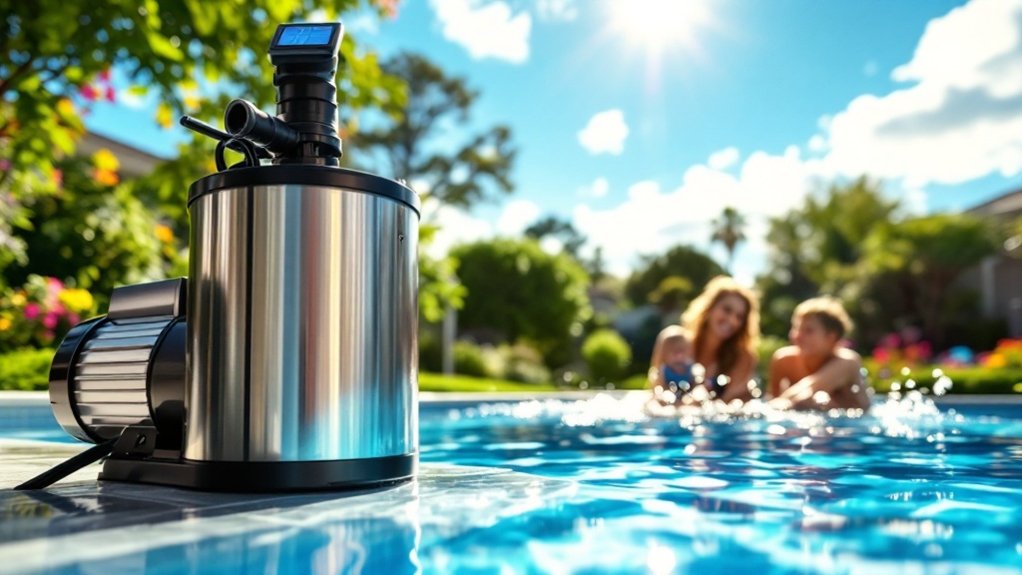Solar pool pumps represent a significant advancement in eco-friendly living. By relying on renewable energy, they reduce dependence on fossil fuels and lower carbon emissions. This technology not only cuts energy costs but also supports sustainable practices. Their quiet operation adds to a tranquil environment. As more people consider their environmental impact, the adoption of solar pool pumps raises important questions about energy efficiency and the future of pool maintenance. What implications could this shift have?
Understanding Solar Pool Pumps: How They Work
Many homeowners are increasingly turning to solar pool pumps as a sustainable and efficient alternative to traditional pool filtration systems. These pumps harness solar energy through photovoltaic panels, converting sunlight into electricity to power the filtration process. Unlike conventional pumps that rely on grid electricity, solar pool pumps operate independently, reducing energy costs and dependence on non-renewable sources. Typically, they consist of a pump, solar panels, and a controller, ensuring optimal performance based on available sunlight. Most systems are designed to work automatically, adjusting the pump’s speed according to the sun’s intensity. This innovative technology not only simplifies pool maintenance but also enhances the longevity of the pool system, making it an attractive choice for eco-conscious homeowners seeking modern solutions.
Environmental Benefits of Solar Pool Pumps
Although solar pool pumps primarily focus on pool maintenance, their environmental benefits extend far beyond simple filtration. By harnessing solar energy, these pumps notably reduce reliance on fossil fuels, lowering carbon emissions associated with traditional electric pumps. This shift not only helps combat climate change but also promotes sustainable energy practices. Additionally, solar pool pumps often use less electricity, conserving energy resources and reducing the overall environmental footprint of pool ownership. Moreover, these pumps can operate quietly and efficiently, minimizing noise pollution and disturbances in residential areas. Overall, the adoption of solar pool pumps contributes to a healthier ecosystem, promoting eco-friendly living while ensuring cleaner and more sustainable recreational spaces for future generations.
Cost Savings: Lowering Your Energy Bills
The financial advantages of solar pool pumps are significant, particularly when it comes to reducing energy bills. Traditional electric pool pumps can consume substantial electricity, leading to high monthly costs. In contrast, solar pool pumps harness the sun’s energy, which can dramatically lower or even eliminate these expenses. By relying on renewable energy, homeowners can enjoy substantial savings over time. Additionally, many regions offer incentives or rebates for solar installations, further enhancing the financial appeal. As energy rates continue to rise, the cost-effectiveness of solar pool pumps becomes increasingly relevant. Ultimately, the shift to solar technology not only supports eco-friendly living but also provides a more affordable solution for maintaining pool operations.
Maintenance and Longevity of Solar Pool Pumps
While solar pool pumps are celebrated for their cost-saving benefits, their maintenance and longevity are equally crucial factors to take into account. Regular maintenance can enhance the lifespan of these pumps, ensuring they operate efficiently. Owners should routinely clean the solar panels to maximize sunlight absorption and inspect the system for debris or wear. Additionally, checking and replacing filters as needed can prevent clogs and maintain peak performance. The longevity of solar pool pumps is influenced by the quality of components used, with higher-quality materials offering better durability. By adhering to a consistent maintenance schedule, users can not only extend the life of their solar pool pumps but also maintain their eco-friendly advantages for years to come. Regular service and maintenance can also reduce the risk of accidents, ensuring a safer swimming environment.
Installation Process: Transitioning to Solar Power
Shifting to solar power for pool pumps involves a systematic installation process that can considerably enhance energy efficiency. First, homeowners must assess their pool size and existing pump specifications to determine the appropriate solar pump system. Next, they should select a suitable location for the solar panels, ideally an area with maximum sunlight exposure. This is followed by mounting the solar panels securely and connecting them to the pump. Electrical connections must be established, guaranteeing compliance with local codes and safety standards. Once the system is connected, it undergoes a thorough testing process to verify functionality. Finally, regular checks and maintenance of the installation guarantee peak performance, ultimately contributing to sustainable pool management and reduced energy costs.
The Future of Eco-Friendly Pool Maintenance
As homeowners increasingly adopt solar pool pumps, the landscape of eco-friendly pool maintenance continues to evolve. These pumps not only harness renewable energy but also reduce reliance on traditional electricity sources, leading to lower carbon footprints. Innovations in smart technology are further enhancing sustainability, allowing for automated monitoring and efficient water management. Future advancements may include enhanced filtration systems that minimize chemical use and promote water conservation. The integration of AI-driven solutions can optimize energy consumption and streamline maintenance schedules, ensuring pools remain pristine while minimizing environmental impact. As awareness of ecological issues grows, the pool maintenance industry is likely to innovate continuously, making eco-friendly practices the norm rather than the exception. This shift promises a greener future for pool ownership.
Frequently Asked Questions
Can Solar Pool Pumps Work in Cloudy or Rainy Weather?
Solar pool pumps can operate in cloudy or rainy weather, although their efficiency may decrease due to reduced sunlight. They still harness available solar energy, ensuring continued functionality and contributing to overall pool maintenance.
What Size Solar Pump Do I Need for My Pool?
Selecting the appropriate size solar pump for a pool depends on its volume, surface area, and desired turnover rate. Generally, a pump should circulate the entire pool’s water within eight hours for maximum efficiency.
How Long Do Solar Pool Pumps Typically Last?
Solar pool pumps typically last between 5 to 15 years, depending on factors such as maintenance, usage, and environmental conditions. Regular upkeep can greatly extend their lifespan, ensuring efficient operation throughout their service life.
Are There Any Rebates for Installing Solar Pool Pumps?
Inquiring about rebates for solar pool pumps reveals that many local governments and utility companies offer incentives. These rebates vary by region, promoting renewable energy adoption while reducing installation costs for environmentally conscious homeowners.
Can I Use a Solar Pool Pump With a Saltwater Pool?
A solar pool pump can be effectively used with a saltwater pool. These pumps are compatible with the saltwater system, providing efficient circulation and filtration without compromising water quality or damaging equipment.
Conclusion
In conclusion, solar pool pumps offer a sustainable solution for pool maintenance, greatly reducing environmental impact and energy costs. By utilizing renewable energy, they contribute to a greener lifestyle while promoting quieter, cleaner recreational spaces. The ease of installation and the low maintenance requirements further enhance their appeal, making them a practical choice for eco-conscious homeowners. As the demand for eco-friendly solutions grows, solar pool pumps stand out as a forward-thinking option for the future of pool care.




